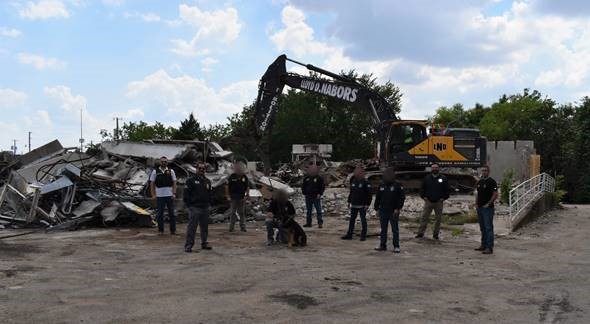Han Gil Hotel demolished, was a "safe haven" for drug distributors

DALLAS - On Tuesday, demolition crews began razing Han Gil Hotel Town, the drug-infested Dallas motel at the center of a 23-defendant drug trafficking probe, announced DEA Special Agent in Charge of the Dallas Field Division Eduardo A. Chávez and U.S. Attorney for the Northern District of Texas Erin Nealy Cox.
Shuttered since the U.S. Attorney’s Office obtained a Temporary Restraining Order prohibiting use of the property in March 2019, the Han Gil was forfeited to the government and sold, interlocutory, by the U.S. Marshals to a local developer. The contract negotiated by the U.S. Attorney’s Office included a condition that the developer buy the property “as is,” and demolish the building within 120 days of closing.
In a civil case, the government argued that for years, the hotel – which was located diagonally across from a local elementary school – served as home base for multiple drug dealers selling heroin, crack cocaine, and methamphetamine. The building functioned as a “safe haven for drug distributors” and a “breeding ground for escalating criminal activity,” prosecutors said. The court agreed, stating that the building “endangers the general welfare of the community.”
At least three victims are known to have died of drug overdoses inside the hotel, their bodies dumped by “cleanup crews” who failed to report their deaths. Numerous other drug users, who often injected themselves while still on the premises, were subjected to beatings, sexual abuse, and brutality by the dealers headquartered there.
“Drug trafficking and the violent acts that accompany it destroy lives and leave families shattered. Now, the Han Gil, through its shattered glass and destroyed walls, will no longer be a visible symbol of the abhorrent crimes committed within its walls,” said Special Agent in Charge Chávez. “The North Texas Strike Force will continue its relentless pursuit of justice to ensure those who prey on the addicted are held accountable.”
“For far too long, the Han Gil played host to a parade of despicable criminals engaged in drug dealing, murder, and human trafficking,” said U.S. Attorney Nealy Cox. “With the destruction of the building, we have closed a chapter of the Han Gil horror story – but rest assured, our work taking down the many drug dealers that once frequented the facility is far from over.”
The Han Gil’s former owner, Su Amos Mun, was charged in parallel criminal proceedings with maintaining a drug-involved premises, a violation of the Controlled Substances Act. He pleaded guilty in August 2019 and was sentenced to 20 years in federal prison.
According to his plea papers, Mun, 65, admitted that despite being aware of deadly overdoes, he allowed dealers to openly sell illicit drugs from inside his hotel rooms, charging them an inflated daily rate, or “drug tax,” to operate with impunity.
To date, 23 defendants have been charged in the Han Gil cases; 17 have pleaded guilty, including the hotel’s top dealers.
Eric Dewayne Freeman, aka “Stuff,” and Kendrick Lamel Washington, aka “Kiki,” both pleaded guilty to conspiracy to possess with intent to distribute heroin and possession of a firearm in furtherance of a drug trafficking crime and were sentenced to a combined 60 years in federal prison.
The pair admitted that they and other dealers routinely used so-called “trap rooms” within the Han Gil to peddle drugs, and that Mun tipped them off before law enforcement or city officials entered the premises.
Washington, 40, admitted that he acted as Freeman’s enforcer, using tactics “designed to instill fear” in individuals Freeman believed had stolen from him or owed him money. In December 2018, Washington used a cell phone to record Freeman, 44, torturing a young man with a blow torch.
The demolition of the site this week began with an excavator ripping through the rear portion of the building. After demolition is completed, the developer plans to replace the former drug den with new, mixed use apartment and retail buildings.
The Drug Enforcement Administration conducted the investigation with assistance from the Federal Bureau of Investigation, Coppell Police Department, Dallas Police Department, the Bureau of Alcohol, Tobacco, Firearms & Explosives, the U.S. Marshal’s Service, Grand Prairie Police Department, Arlington Police Department, Grapevine Police Department, Lancaster Police Department, the State Department, IRS Criminal Investigation, U.S. Postal Inspection Service, Plano Police Department, Farmers Branch Police Department, Homeland Security Investigations, Garland Police Department, Rowlett Police Department, Denton Police Department, Lewisville Police Department and McKinney Police Department. Assistant U.S. Attorneys Scott Hogan, NDTX’s Civil Chief, Lindsey Beran, and Braden Civins filed the civil case. Assistant U.S. Attorneys Rick Calvert, Chief of NDTX’s Narcotics Section, and Phelesa Guy are prosecuting the criminal case. Assistant U.S. Attorneys Beverly Chapman and Melissa Childs handled the forfeiture.


